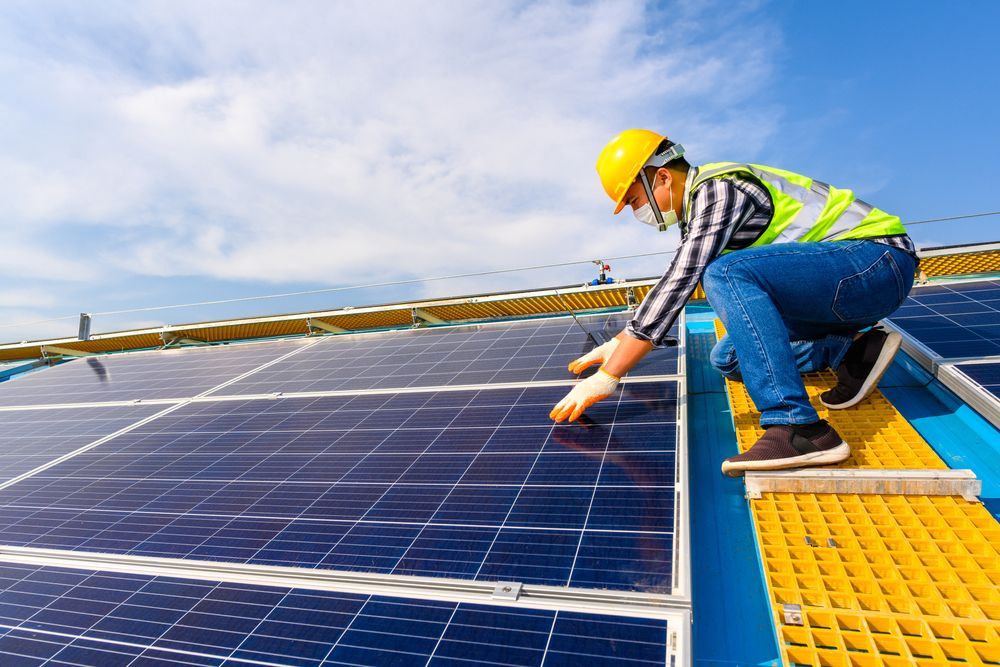
Investing in a solar power system is a big decision, and choosing the best company for solar installation can be confusing. Homeowners should get quotes and information from at least three companies before they sign contracts for installation. During the interview process, homeowners should ask these 17 questions to help get the best upfront price while preventing unexpected costs in the future.
1. Where is the company headquarters?
It is easier to get responsive service from locally owned and operated companies during the installation process. Ask staff from national companies how they handle out-of-state customers who need support after the system is installed.
2. Who completes the installation?
Some companies, whether local or national, use subcontractors who may not have specialty training for the on-site installation work. Homeowners who want high-quality control over the installation process should ask for installers who are certified and full-time employees for the company.
3. How efficient are the panels to be installed?
Quality, high-efficiency panels will save the most money over time but may cost more upfront. Low-efficiency panels may be cheaply made for a lower initial cost but reduce the total potential savings of switching to solar.
4. How experienced is the company?
New companies who have not completed many installations will be less familiar with the laws and tax incentives for the local area. Find out how long the company has been operating and how many clients they have worked with.
5. How do they handle paperwork?
With all the tax breaks, grants, and other paperwork for renewable energy credits, there can be a lot of paperwork involved in installing solar. Ask if the company plans to prepare the documents before installation begins or can provide assistance for homeowners who attempt this on their own.
6. Is the company NABCEP certified?
Most states hold licensing requirements for PV installations professionals as a minimum required certification. The North American Board of Certified Energy Practitioners (NABCEP) offers an additional voluntary certification that demonstrates an installer has completed additional training and testing. Certified companies should be able to show proof that their workers hold this higher standard of expertise.
7. Will any subcontractors be involved?
It’s not unusual for a company to use some subcontracted labor for various parts of the job, but they should be able to name the companies or individuals they hire and describe the qualifications and credentials for everyone working on the installation.
8. What fire codes are involved for this job?
Fire code is different in each state, but reputable companies should have this information ready for each individual job. Homeowners should do their research on local codes and double-check that the company has a plan to adhere to their state-specific requirements.
9. Who manufactures the inverters and what warranties are offered?
Online reviews are available for solar module manufacturers. Take notes on which manufacturers a company uses and make sure the quality and warranty service experience is acceptable to you.
10. What licenses are required for this installation?
Licensing requirements vary by state and municipality: a quality company should have this information prepared to discuss. The company will need a business license and may also need general contracting or home improvement licenses as well. A licensed electrician may be needed for the installation. Question the insurance policies for how injuries to workers or damages to the home would be handled if an accident arises during installation.
11. What other certifications do they hold?
Beyond the required licenses, the NABCEP certification can be granted by the North American Board of Certified Energy Practitioners for installers who have completed at least three installations and a full week of extra training on the codes and safety issues for electrical, fire, and construction involved in the job. There is an entry-level NABCEP program, but look for companies and installers that have the full certification. This is the "gold standard" for companies because it recognizes a higher level of standards for safety, training, and customer service, as well as a commitment to keeping certified installers on staff. Ask for at least one NABCEP certified installer to be on the crew during the job.
12. Who will come to the house?
Particularly if when using a company that employs subcontractors for some or all of the labor, get a list of all the installation companies and individuals the solar company expects to arrive on site. Find out if the solar company will be providing a supervisor to coordinate and ensure quality checks are being done for all installation procedures.
13. What is the warranty on the installation?
Solar panel manufacturer and inverter technology companies cover their hardware through manufacturer warranties that do not vary too much across the industry. The installation labor is not covered under these warranties, so a solar company should provide some guarantees to cover any damage or malfunction related to the installation. At minimum, they should offer a one-year warranty, but since the life of the solar energy system is 25+ years, many consumers ask for a 10-year warranty to protect their expensive investment.
14. What incentive programs can the company offer?
There are many incentives at the national, state, and local level available to homeowners who switch to solar energy. A generous tax credit of up to 30% of the solar system can be applied, and rebates on new systems can be awarded by states or cities. Thanks to forward-thinking utility companies, cash programs also exist in some areas to help homeowners acquire arrays. A good company will be able to find the most applicable incentives for each specific installation.
Read next


Buying Guide For Finding Your Car

